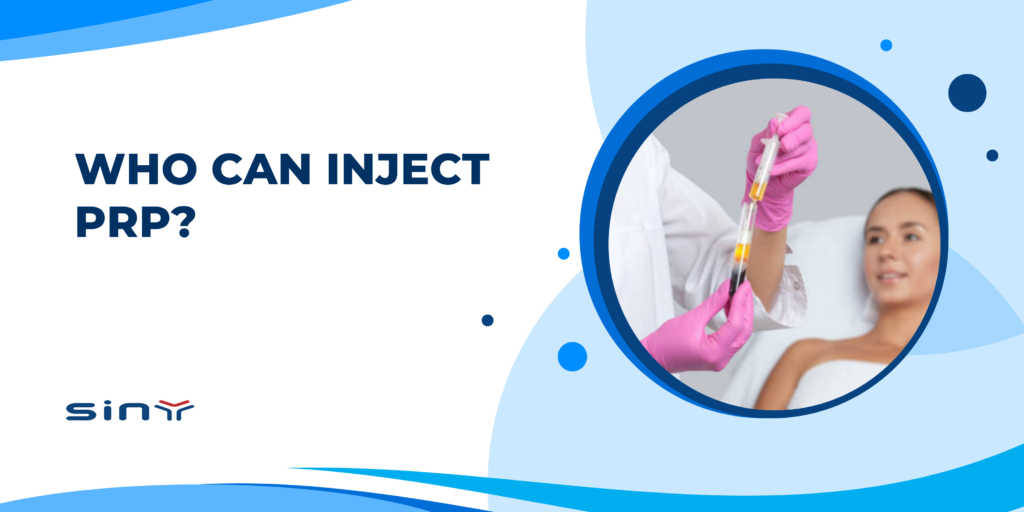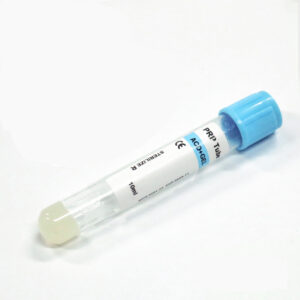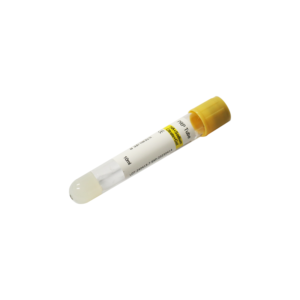Who can inject PRP? With the rapid advancement of regenerative medicine, Platelet-Rich Plasma (PRP) therapy has become a cornerstone treatment in fields like orthopedics, sports medicine, dermatology, and medical aesthetics. For clinics, practitioners, and distributors looking to source essential supplies like PRP tubes, the sheer number of products on the market can make the selection process feel overwhelming. This guide breaks down the core elements of PRP therapy, underscores the importance of practitioner qualifications, and clarifies how choosing a high-quality PRP product and supplier decisively ensures safety, enhances efficacy, and builds professional trust.
Who is Qualified to Perform PRP Injections?
First and foremost, it is crucial to understand who is qualified to administer PRP injections. As a medical procedure, PRP therapy involves professional steps including blood drawing, processing, and precise injection. Therefore, it must be performed by a licensed medical professional, such as a physician, a nurse practitioner, or other qualified medical personnel acting under a physician’s direct supervision. While specific regulations may vary by country and region, the universal requirement is a deep understanding of medicine, sterile techniques, and human anatomy. This is not only a safeguard for patient safety but also the fundamental basis for achieving the desired therapeutic results.
The Decisive Impact of High-Efficiency PRP Preparation
A practitioner’s expertise is only one part of the success equation. The quality of the PRP itself—specifically, its platelet concentration, purity, and viability—is just as critical in determining the treatment’s outcome. This quality is directly dependent on the supplies used during preparation, especially the PRP tube. A well-designed, high-grade PRP tube utilizes precise centrifugation protocols to effectively separate and concentrate platelets while minimizing contamination from red blood cells and pro-inflammatory white blood cells. This means that any practitioner committed to delivering a higher standard of care must first select an efficient, high-performance PRP product.
How to Identify an Excellent PRP Tube Supplier
Faced with a crowded marketplace, how can private clinics and distributors make an informed decision? The key lies in evaluating the supplier and their products holistically. A reliable supplier offers not just a product, but a promise of quality and professional support. When making your selection, be sure to consider the following points:
- Certifications and Compliance: Ensure the PRP tubes have received certifications from authoritative bodies like CE, ISO, or the FDA. This is a fundamental assurance of the product’s safety and effectiveness.
- Product Performance: Inquire about key performance metrics, such as the platelet recovery rate, concentration factor, and efficiency in leukocyte reduction. Superior products yield PRP with a higher concentration of regenerative growth factors, leading to better clinical results.
- Materials and Technology: Examine the quality of the tube material, the type of anticoagulant used, and the effectiveness of the separating gel. These details directly impact the purity and biocompatibility of the final PRP product.
- Supply Chain Reliability: A mature supplier can guarantee a consistent and stable supply chain, preventing disruptions to your clinic’s operations due to inventory shortages.
FAQs
Q1: Is PRP therapy suitable for all patients?
A1: While PRP therapy is very safe, it is not recommended for everyone. Individuals with platelet dysfunction, blood disorders, active infections, sepsis, certain autoimmune conditions, or those who are pregnant or breastfeeding are typically not candidates. A thorough evaluation by a qualified physician is essential before treatment.
Q2: How important are the materials and anticoagulants in a PRP tube?
A2: The tube material must be medical-grade and biocompatible to prevent premature platelet activation or adverse reactions. The anticoagulant (e.g., Sodium Citrate) is crucial for preventing blood from clotting before separation is complete. Its type and concentration must be precisely balanced to be effective without compromising platelet viability. You can learn more about the specifics of our [PRP tubes here]
Q3: For which clinical applications does the quality of the prepared PRP matter most?
A3: PRP quality is vital for all applications. However, it is especially critical for treating chronic conditions like tendinopathies (e.g., tennis elbow), osteoarthritis, and for regenerative purposes such as skin rejuvenation and hair restoration. In these areas, a high concentration of growth factors is paramount for stimulating a robust healing response, making high-quality PRP preparation essential for success.
Summary
Ultimately, choosing a PRP product supplier is a strategic decision that impacts your clinic’s reputation and your patients’ well-being. An exceptional supplier acts as more than a vendor; they are a partner. They provide not just standardized products, but also ongoing technical support, clinical application guidance, and keen insights into market trends. Partnering with such a supplier empowers you to provide cutting-edge treatments to your patients while building a solid foundation for your practice’s growth and brand reputation. To ensure every PRP treatment you deliver meets the highest standard, exploring and selecting clinically-proven, high-performance PRP solutions is your critical next step. [clinically-proven, high-performance PRP solutions] is your critical next step.





